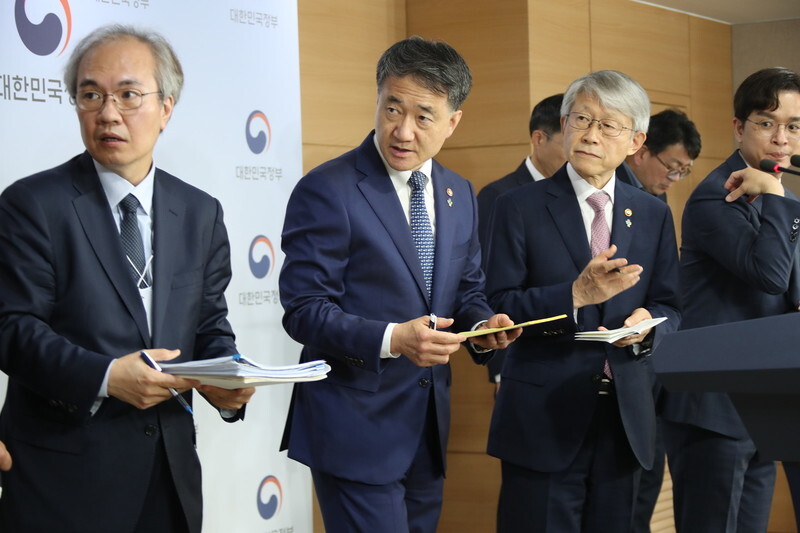hankyoreh
Links to other country sites 다른 나라 사이트 링크
S. Korea to invest over US$80 million in COVID-19 treatments and vaccine
Food and Drug Ministry to approve special importation of remdesivir

The South Korean government plans to invest over 100 billion won (US$82.1 million) on clinical trials in the second half of the year to meet targets of developing treatments for the novel coronavirus within 2020 and a vaccine by next year. The Ministry of Food and Drug Safety (MFDS) also decided to approve special importation of remdesivir, a candidate treatment for the virus developed by the US pharmaceutical company Gilead Sciences.
On June 3, Minister of Health and Welfare Park Neung-hoo shared the plans at a press conference held at the Westin Chosun Seoul hotel following a third meeting of a pan-governmental support team for developing COVID-19 treatments and a vaccine. As part of the third supplementary budget plan announced the same day, the Ministry of Health and Welfare (MOHW) included 1.05 trillion won (US$862.4 million) toward job creation and social safety net projects as well as the “Korean New Deal,” which includes boosting “K-disease prevention,” R&D investment, and building non-interactive infrastructure for infectious diseases. Included in that amount was 140.4 billion won (US$115.3 million) to be spent this year toward clinical trials for COVID-19 treatments and vaccines, acquiring advanced disease prevention equipment, and establishing a national virus and infectious disease research institute.
The government plans to focus its support for three main types of COVID-19 treatments: plasma treatments, antibody treatments, and medication production. In the case of plasma treatments, it has set the aim of achieving development within the year through support for clinical trials. Plasma treatments involve extracting and concentrating plasma from patients who have fully recovered from the virus. Recovered patients are currently being recruited to participate in Ansan, Daegu, and elsewhere in conjunction with the Red Cross.
In the case of vaccines, one synthetic antigen vaccine and two DNA vaccines are currently in development, with budgetary support to be provided toward their success by the second half of 2021. The MOHW plans to launch a vaccine commercialization project next month, with 600 billion won (US$492.4 million) to be invested over a 10-year period. The MOHW also plans to establish a national virus and infectious disease research institute in the second half of 2020 for R&D related to ongoing infectious diseases. In parallel with this, the Ministry of Science and ICT (MSIT) plans to establish the “Korean Basic Virus Research Institution” to conduct basic research on plant and animal viruses in general.
A decision was also made the same day to approve special importation of remdesivir, which is currently being developed as a COVID-19 treatment. The Korea Centers for Disease Control and Prevention (KCDC) plan to begin discussions on importation shortly with the MFDS and other relevant agencies as well as Gilead Sciences. The special importation system for pharmaceuticals allows for the importation of medications that have not received domestic approval in order to respond to a public health crisis. The MFDS explained that the “reduction in treatment times for severe patients through the use of remdesivir has been significant, and we need to additionally acquire treatments to choose from.”
“The fact that the US, Japan, and the UK have allowed the use of remdesivir was also taken into account,” the ministry added.
The MOHW also announced plans to pursue the enactment of a “special coronavirus law” to provide swift financial support and permits/approvals to prepare for future crises involving infectious diseases.
By Lee Keun-young, staff reporter
Please direct comments or questions to [english@hani.co.kr]

Editorial・opinion
![[Column] Has Korea, too, crossed the Rubicon on China? [Column] Has Korea, too, crossed the Rubicon on China?](https://flexible.img.hani.co.kr/flexible/normal/500/300/imgdb/original/2024/0419/9317135153409185.jpg) [Column] Has Korea, too, crossed the Rubicon on China?
[Column] Has Korea, too, crossed the Rubicon on China?![[Correspondent’s column] In Japan’s alliance with US, echoes of its past alliances with UK [Correspondent’s column] In Japan’s alliance with US, echoes of its past alliances with UK](https://flexible.img.hani.co.kr/flexible/normal/500/300/imgdb/original/2024/0419/2317135166563519.jpg) [Correspondent’s column] In Japan’s alliance with US, echoes of its past alliances with UK
[Correspondent’s column] In Japan’s alliance with US, echoes of its past alliances with UK- [Editorial] Does Yoon think the Korean public is wrong?
- [Editorial] As it bolsters its alliance with US, Japan must be accountable for past
- [Guest essay] Amending the Constitution is Yoon’s key to leaving office in public’s good graces
- [Editorial] 10 years on, lessons of Sewol tragedy must never be forgotten
- [Column] A death blow to Korea’s prosecutor politics
- [Correspondent’s column] The US and the end of Japanese pacifism
- [Guest essay] How Korea turned its trainee doctors into monsters
- [Guest essay] As someone who helped forge Seoul-Moscow ties, their status today troubles me
Most viewed articles
- 1[Column] The clock is ticking for Korea’s first lady
- 2After 2 months of delayed, denied medical care, Koreans worry worst may be yet to come
- 3Hong Se-hwa, voice for tolerance whose memoir of exile touched a chord, dies at 76
- 4[Column] Has Korea, too, crossed the Rubicon on China?
- 5US overtakes China as Korea’s top export market, prompting trade sanction jitters
- 6Samsung barricades office as unionized workers strike for better conditions
- 7[Editorial] As it bolsters its alliance with US, Japan must be accountable for past
- 8[Correspondent’s column] In Japan’s alliance with US, echoes of its past alliances with UK
- 9All eyes on Xiaomi after it pulls off EV that Apple couldn’t
- 10[Correspondent’s column] The US and the end of Japanese pacifism